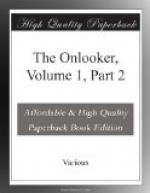* * * * *
Hurrah for Noah
But these reverend gentlemen must not go too far. One may regret Adam, and his extinction may start fissures in many genealogical trees, but to such of us as only “came over in the Mayflower,” or “with the Conqueror,” his flop into oblivion may entail no serious damage to existing rights. Upon Moses I always looked as a person of doubtful parentage, and a leader who, had he lived in recent centuries, would have been sacrificed by his own men within a month at most. His only title to fame is that he kept the Jews for forty years from appropriating anything but a desert which nobody else wanted and was a blistering hindrance to them. The story of Moses certainly has weak spots. Too much is known of the localities which he frequented. The crossing of the Red Sea without even getting his boots full of water seems too lurid an accomplishment for a pedestrian who consumed forty years in reaching the confines of an ordinary desert. His disappearance will cause but little clamor. Then there is Jonah. Those who know the sea, or have a passing acquaintance with fish, place no reliance upon the Jonah-whale story. Jonah will not be missed greatly. But I must insist upon the preservation of Noah. In him are we all—no creed nor color barred—indebted for our first striking and imperfect impressions of the animal kingdom. No liar could have invented the story of the flood. It is of too wholesale a character for pure invention, and the few details which accompany it wear an air of truth. Unless it were founded upon fact, could manufacturers all over the world have been induced to strengthen it and put money in their purse by turning out, annually, not millions but trillions of Noah’s arks? Once shake the belief of childhood in the stability of Noah and ruin will fall upon a great industry, for machinery which will turn out a never-ending stream of Noah’s arks could not be driven to turn out anything else. There is nothing to take the place of Noah’s ark, as there is no one to take the place of Noah. In other lines trade may follow the flag, but in the Noah’s ark industry it follows a belief in Noah and is known to every flag that has ever waved, paying allegiance to no particular banner. Before these fatiguing divines drive even a tack into Noah’s coffin, let them provide us with a personage of equal interest and influence. If they are not permitted to move further in their scheme of destruction until they do this, Noah is safe. They can only try to kill; they cannot create.




